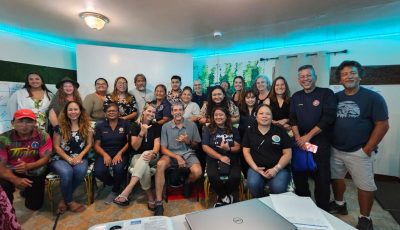Camacho: DFEMS, CHCC not entitled to restitution in fatal hit-and-run case
The Superior Court ruled yesterday that the Department of Fire and Emergency Medical Services and the Commonwealth Health Care Corp. are not entitled to restitution in a fatal vehicular hit-and-run case because they are only third-party indirect victims.
Associate Judge Joseph N. Camacho denied the CNMI government’s request to hold Esekiel “Easy” Smith liable to pay $1,866 in restitution for medical services provided by DFEMS and CHCC to the victim in the accident.
Camacho, however, found that Smith is liable for $4,972 in restitution payment to the victim’s mother, Gloria Cabrera.
The Office of the Attorney General had asked for a total of $8,613 in restitution. Smith conceded that he owed $4,972 in restitution.
Camacho also ruled that the tort defense of comparative negligence does not apply in this case because family members of victim Melton Agulto did not negligently contribute to their damages.
The judge also ruled that voluntary offertory gifts to a priest performing the funeral mass are gifts and, therefore, are not economic losses for purposes of restitution under the statute.
Camacho said the $200 offertory gift from the victim’s family to the priest performing the funeral Mass cannot be described as an economic loss that was the result of Smith’s criminal conduct because, though the definition of “restitution” includes funeral expenses, the money was a voluntary gift.
According to court records, in the evening of Aug. 18, 2019, Agulto was intoxicated and got into physical altercations—first at the San Vicente basketball court and then later at his home. The altercations caused Agulto to sustain injuries and he was taken to the Commonwealth Health Center. At the hospital, Agulto acted belligerently with the CHC personnel, then fled on foot from the hospital. Police failed to locate him.
After midnight on Aug. 19, 2019, Smith, who was driving a vehicle north in Puerto Rico, hit Agulto as the latter was walking in the middle of the street. Smith fled the scene after the accident. Agulto died as a result of his injuries.
In the same morning of the accident, Smith appeared at the police station and voluntarily surrendered to police.
On Jan. 30, 2019, Smith accepted responsibility and pleaded guilty to the charges of leaving an accident scene and reckless driving. That same day, he was sentenced to five years and six months imprisonment, with the last six months suspended.
Smith was ordered to pay restitution to Agulto’s family and made eligible for work release while serving his sentence to pay the restitution.
The parties agreed that, at a minimum, Smith owed $1,000 in restitution. The defendant immediately paid the amount from the bail money that he had posted.
The parties disagreed as to how much was owed in restitution and to whom.
On June 5, 2019, Camacho held a restitution hearing. Assistant attorney general J. Robert Glass Jr. appeared for the government. Assistant public defender Jean Pierre Nogues represented Smith.
Nogues argued that DFEMS and CHCC were not victims in this case and are not entitled to restitution, and that the tort defense of comparative negligence should apply in this matter.
In his ruling yesterday, Camacho said Smith’s reckless driving and act of leaving the scene of the accident were committed against Agulto, not DFEMS and CHCC. Camacho said neither were DFEMS and CHCC the immediate objects of Smith’s crimes. The judge said the only harm that DFEMS and CHCC can claim to have suffered is the economic damage caused by the uncompensated medical care that they provided to Agulto.
Camacho said because DFEMS and CHCC are government agencies and as government agencies would not be entitled to restitution if they were “direct victims of Smith’s crimes, the court finds that the agencies are only indirect third-party victims and therefore not entitled to restitution.
Camacho said the only victim entitled to restitution is Agulto’s mother, Gloria Cabrera, who is seeking restitution for the economic harm she experienced.
The judge said because Smith failed to show that Cabrera negligently contributed to her economic harm, and as Cabrera is only seeking restitution for her own economic loss, the court finds that the tort defense of comparative negligence is inapplicable in this case.
As for the remaining $1,775 disputed by Smith, Camacho said the government failed to prove that Smith owes the amount.
Cabrera testified the alleged payments of $100 for the social hall for the funeral gathering; $125 for a picture frame; $250 for the Heart of Worship Choir to perform at the funeral Mass; $380 for printing the funeral program; and $720 for the ice and drinks.
Camacho said Cabrera, however, did not herself contract or pay for these services and she did not know who did.
Camacho said although the government did produce a ledger showing the alleged payments, the ledger did not say who paid for the services.
The judge said the government failed to provide credible evidence to address the discrepancies and ambiguities in the amount of restitution sought for these items.



























